 As the COVID pandemic continues, we have written a number of articles about the supply chain impact and the shortages of products and supplies that has ensued. Recently, there was a concern that there would be a shortage of glass vials for a vaccine that could hinder production. And I just read about another shortage that could impact the vaccine timeline: monkeys. Yes, monkeys. Over the past seven months, more than 100 COVID-19 vaccines, therapies, and drugs have been pushed into development. However, for any of these tests to make it to the table, they first need to be tested on another animal, which is usually monkeys. And the US is facing a shortage as monkeys simply cannot be acquired. According to the article, the reasons for the shortage are threefold. First, COVID-19 has created more demand for monkeys than normal. Second, there has been a massive drop in supply from China, which supplies 60 percent of monkeys to the US. And third, pandemic-related events are exacerbating preexisting monkey shortfalls. On top of this, any monkey infected with COVID-19 needs to be kept in a specially designed lab, which the US has a limited number of. Hopefully there are other testing alternatives available. And now on to this week’s logistics news.
As the COVID pandemic continues, we have written a number of articles about the supply chain impact and the shortages of products and supplies that has ensued. Recently, there was a concern that there would be a shortage of glass vials for a vaccine that could hinder production. And I just read about another shortage that could impact the vaccine timeline: monkeys. Yes, monkeys. Over the past seven months, more than 100 COVID-19 vaccines, therapies, and drugs have been pushed into development. However, for any of these tests to make it to the table, they first need to be tested on another animal, which is usually monkeys. And the US is facing a shortage as monkeys simply cannot be acquired. According to the article, the reasons for the shortage are threefold. First, COVID-19 has created more demand for monkeys than normal. Second, there has been a massive drop in supply from China, which supplies 60 percent of monkeys to the US. And third, pandemic-related events are exacerbating preexisting monkey shortfalls. On top of this, any monkey infected with COVID-19 needs to be kept in a specially designed lab, which the US has a limited number of. Hopefully there are other testing alternatives available. And now on to this week’s logistics news.
- Amazon in the news:
- UPS subsidiary integrates with Google Shopping
- Walmart’s subscription program to launch September 15
- Pilot program would test 3-hour “pause” of driving clock
- Whole Foods opens first all dark store
- Waymo picks Dallas for driverless trucking hub
- Cargo theft forecasted to spike on Labor Day weekend
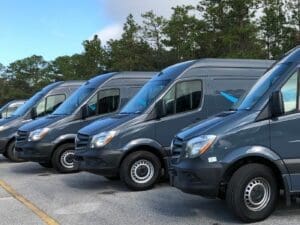 As part of its sustainability plans, Amazon is investing heavily in electric vans. In 2019, the company launched its climate pledge to become carbon neutral by 2040 and ordered 100,000 electric vans from US startup Rivian Automotive LLC. Now, Amazon has ordered 1,800 electric vans from German manufacturer Mercedes-Benz to expand its European delivery fleet. The order consists of 600 midsize eVitos, which are mainly to be used in inner cities, and 1,200 larger eSprinters, which is Mercedes-Benz’s newest electric commercial van. The plan is to have drivers using the vans before the end of the year. According to Jeff Beos, the vans are part of the company’s “journey to build the most sustainable transportation fleet in the world.”
As part of its sustainability plans, Amazon is investing heavily in electric vans. In 2019, the company launched its climate pledge to become carbon neutral by 2040 and ordered 100,000 electric vans from US startup Rivian Automotive LLC. Now, Amazon has ordered 1,800 electric vans from German manufacturer Mercedes-Benz to expand its European delivery fleet. The order consists of 600 midsize eVitos, which are mainly to be used in inner cities, and 1,200 larger eSprinters, which is Mercedes-Benz’s newest electric commercial van. The plan is to have drivers using the vans before the end of the year. According to Jeff Beos, the vans are part of the company’s “journey to build the most sustainable transportation fleet in the world.”
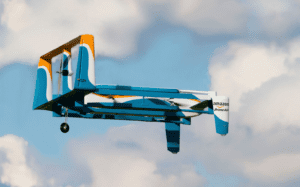 As interest in drone deliveries continues to heat up, Amazon took a big leap forward in its quest to use the autonomous flying vehicles as part of its home delivery strategy. According to the company, earlier this week the Federal Aviation Administration (FAA) designated Amazon Prime Air an “air carrier,” which allows Amazon to begin its first commercial deliveries in the US under a trial program. There are still a number of regulatory hurdles that Amazon must clear before it begins making home deliveries, but this is clearly a step in the right direction for drone usage. Amazon joins Wing, the Alphabet Inc. subsidiary, and UPS as companies that have gotten FAA approval to operate under the federal regulations governing charter operators and small airlines.
As interest in drone deliveries continues to heat up, Amazon took a big leap forward in its quest to use the autonomous flying vehicles as part of its home delivery strategy. According to the company, earlier this week the Federal Aviation Administration (FAA) designated Amazon Prime Air an “air carrier,” which allows Amazon to begin its first commercial deliveries in the US under a trial program. There are still a number of regulatory hurdles that Amazon must clear before it begins making home deliveries, but this is clearly a step in the right direction for drone usage. Amazon joins Wing, the Alphabet Inc. subsidiary, and UPS as companies that have gotten FAA approval to operate under the federal regulations governing charter operators and small airlines.
 Two years ago, UPS launched Ware2Go, its digital fulfillment and warehouse matching service. The on-demand platform enables one-to-two-day shipping across the US using its real-time inventory platform. In a big move, Ware2Go is partnering with Google Shopping to provide delivery promises within retailers’ Google ads, based on real-time inventory availability across Ware2Go’s fulfillment network. According to the partnership, the integration is intended to help retailers optimize ad efficiency using Google Shopping and drive revenue by advertising free, fast shipping offers earlier in the buyer’s purchase journey.
Two years ago, UPS launched Ware2Go, its digital fulfillment and warehouse matching service. The on-demand platform enables one-to-two-day shipping across the US using its real-time inventory platform. In a big move, Ware2Go is partnering with Google Shopping to provide delivery promises within retailers’ Google ads, based on real-time inventory availability across Ware2Go’s fulfillment network. According to the partnership, the integration is intended to help retailers optimize ad efficiency using Google Shopping and drive revenue by advertising free, fast shipping offers earlier in the buyer’s purchase journey.
 After a number of delays, Walmart is officially ready to launch its answer to Amazon Prime: Walmart+. The service is a new subscription model for Walmart customers that costs $98 a year and includes unlimited free delivery from stores, including groceries, plus gasoline discounts. The coronavirus pandemic has helped create a surge in online orders for Walmart, especially in grocery. The new service expands an existing grocery-delivery subscription that Walmart introduced last year and offers delivery timeframes as fast as same-day. Walmart+ is scheduled to launch September 1.
After a number of delays, Walmart is officially ready to launch its answer to Amazon Prime: Walmart+. The service is a new subscription model for Walmart customers that costs $98 a year and includes unlimited free delivery from stores, including groceries, plus gasoline discounts. The coronavirus pandemic has helped create a surge in online orders for Walmart, especially in grocery. The new service expands an existing grocery-delivery subscription that Walmart introduced last year and offers delivery timeframes as fast as same-day. Walmart+ is scheduled to launch September 1.
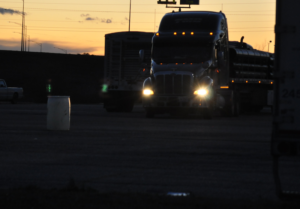 The Federal Motor Carrier Safety Administration (FMCSA) has certainly been busy over the last six-plus months dealing with changing regulations due to coronavirus and hurricane relief efforts. Now, the agency is asking for public comment on a pilot program to study the one part of the hours-of-service proposal that didn’t make it into the final rule: allowing drivers to pause their on-duty driving period with one off-duty period up to three hours. The pilot program would allow drivers one off-duty break of at least 30 minutes, but not more than three hours, which would pause a truck driver’s 14-hour driving window, provided the driver takes 10 consecutive hours off-duty at the end of the work shift. The benefit would be to allow a driver to take a break to avoid rush hour without it affecting their hours of service.
The Federal Motor Carrier Safety Administration (FMCSA) has certainly been busy over the last six-plus months dealing with changing regulations due to coronavirus and hurricane relief efforts. Now, the agency is asking for public comment on a pilot program to study the one part of the hours-of-service proposal that didn’t make it into the final rule: allowing drivers to pause their on-duty driving period with one off-duty period up to three hours. The pilot program would allow drivers one off-duty break of at least 30 minutes, but not more than three hours, which would pause a truck driver’s 14-hour driving window, provided the driver takes 10 consecutive hours off-duty at the end of the work shift. The benefit would be to allow a driver to take a break to avoid rush hour without it affecting their hours of service.
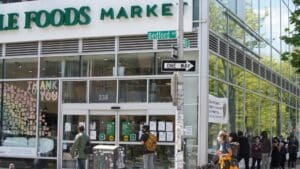 The coronavirus pandemic has created ongoing demand for grocery delivery. As I wrote about a few months ago, Whole Foods had stopped accepting new customers as it simply did not have the capacity to pick, pack, and deliver orders for more consumers. The company has now launched its first online only store in Brooklyn, NY. The dark store will accept online orders only, with a delivery-only fulfillment model. While the store has been in the making for over a year, COVID-19 certainly helped speed things along. Hundreds of employees were hired to work at the store, delivering to customers living in Brooklyn.
The coronavirus pandemic has created ongoing demand for grocery delivery. As I wrote about a few months ago, Whole Foods had stopped accepting new customers as it simply did not have the capacity to pick, pack, and deliver orders for more consumers. The company has now launched its first online only store in Brooklyn, NY. The dark store will accept online orders only, with a delivery-only fulfillment model. While the store has been in the making for over a year, COVID-19 certainly helped speed things along. Hundreds of employees were hired to work at the store, delivering to customers living in Brooklyn.
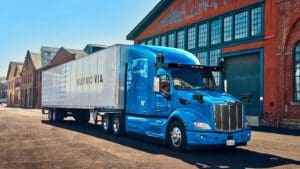 Waymo is joining other autonomous trucks firms building facilities in the Dallas-Fort Worth, TX area to test their autonomous driving capabilities. The Alphabet, Inc. company new permanent facility will initially serve as a hub for road-testing Waymo’s fleet of driverless robotic Peterbilt 579 trucks. Other autonomous firms in the area include Aurora, Nuro, Kodiak Robotics, and TuSimple. According to Waymo spokesperson Julianne McGoldrick:
Waymo is joining other autonomous trucks firms building facilities in the Dallas-Fort Worth, TX area to test their autonomous driving capabilities. The Alphabet, Inc. company new permanent facility will initially serve as a hub for road-testing Waymo’s fleet of driverless robotic Peterbilt 579 trucks. Other autonomous firms in the area include Aurora, Nuro, Kodiak Robotics, and TuSimple. According to Waymo spokesperson Julianne McGoldrick:
“Operating in a major freight hub environment like Dallas, we can test our Waymo Driver on highly dense highways and shipper lanes, further understand how other truck and passenger car drivers behave on these routes, and continue to refine the way our Waymo driver reacts and responds in this busy driving region. It also enables us to further advance our weather testing in a diverse set of environments.”
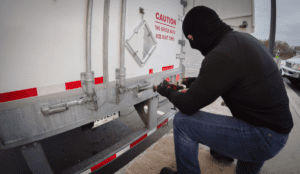 And finally, as we head into the Labor Day holiday weekend, CargoNet, a New Jersey-based cargo theft solution provider, warns that it is a busy time for cargo theft. According to CargoNet’s analysis of historical trends over that period from 2014 to 2019, the most common day for cargo theft is the Friday before Labor Day. With the reality that more and more people are working remotely during the ongoing pandemic, this trend is likely to be exacerbated in 2020. CargoNet advises that supply chain professionals park only in secured facilities with deterrents such as high-visibility lighting, secured fences, surveillance video, or staffed guard services.
And finally, as we head into the Labor Day holiday weekend, CargoNet, a New Jersey-based cargo theft solution provider, warns that it is a busy time for cargo theft. According to CargoNet’s analysis of historical trends over that period from 2014 to 2019, the most common day for cargo theft is the Friday before Labor Day. With the reality that more and more people are working remotely during the ongoing pandemic, this trend is likely to be exacerbated in 2020. CargoNet advises that supply chain professionals park only in secured facilities with deterrents such as high-visibility lighting, secured fences, surveillance video, or staffed guard services.
That’s all for this week. Enjoy the weekend and the song of the week, Monkey Man by Toots and the Maytals.

















